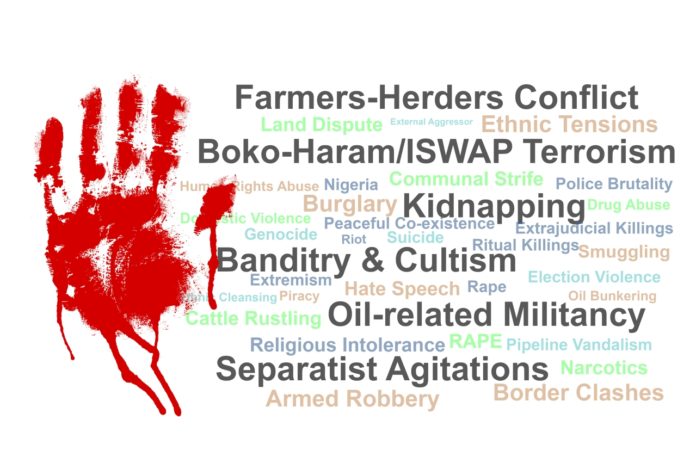By Oseloka H. Obaze
“We are a nation in denial. Rising insecurity in Nigeria did not happen in a vacuum. The “indicators of conduciveness” were discernible. We compartmentalize security to our own detriment.”
Nigeria is security challenged. No national interest issue has singularly dominated Nigeria’s political and socio-economic discourse as insecurity and government’s antipathy towards related public outcry. No nation is insulated from security challenges. Some nations have well-developed response systems and mechanisms. In contrast, Nigeria’s systemic modalities for responding to insecurity focus on “safeguarding” establishment and policy options that are not working.
Concerns are being expressed of a diametric failure in the security sector; the emergence of ungoverned spaces and government’s “crude surrender” to security threats posed by militancy. This amounts to government’s failure to undertake fully the responsibility to protect its citizens.
Nigeria’s inability to tackle insecurity holistically is an overarching factor. Her much-touted security sector reform have yielded less than the desired results as affirmed by the fact that no fewer than 25,794 Nigerians may have died in violent crises in the first four years of the Buhari administration. Such evidential recidivism of revenant insecurity calls for a pause.
The prevailing nature and scope of insecurity in Nigeria attest to an admix of “receding, emerging and resurging issues and trends in the security sector.” Overall, insecurity has been incremental even as one must admit that the present scope has its genesis in the failings of successive governments. For Nigerians, the multidimensional nature of insecurity is a cause for deep trepidation; and a shared sense of bleakness, imminent threat and present danger. Another broadly shared view is that “very few parts of Nigeria are exempt from menace of banditry and kidnappings.” Relatedly, the government, via policy miscues and dismal response to insecurity, has wittingly engaged in the “beatification of stealing” and “pacification” of violent and pillaging herdsmen.
Globally, the nature of insecurity and the methodologies required for tackling them have metamorphosed. Correspondingly, Nigeria now resorts to multilateral measures and mechanisms, such as the Multinational Joint Task Force (MNJTF) to tackle Boko Haram, the ECOWAS Integrated Maritime Strategy (EIMS) and the Gulf of Guinea Yaoundé Code of Conduct to tackle piracy. Domestically, government now deploy variants of military operations to tackle insecurity. What is missing is a strategic balance in the use of military “hard power” and civilian institutions’ “soft power” mechanisms and civilian police conflict resolution methods.
We are a nation in denial. Rising insecurity in Nigeria did not happen in a vacuum. The “indicators of conduciveness” were discernible. Disconcertingly, their cumulative negative impact are being exacerbated by the lack of state penetration, lack of state monopoly of force, lack of border controls, external interference, shifting demographics, and rogue non-state actors’ obvious possession of adequate infrastructure and funding.
The six most dominant security issues and trends in Nigeria are; farmers-herders conflict, Boko-Haram/ISWAP terrorism, kidnapping, banditry and cultism, oil-related militancy, and separatist agitations. That these challenges fester can be linked to governmental shilly-shally, as evidenced by its unwillingness to deal decisively with herdsmen violence.
Meanwhile, the national death toll from various incipient and entrenched conflicts are spiralling upwards; while 3,641 people died in the clashes from 2015 to late 2018, presently the fatalities are over 4,000 lives. The resultant effect of Boko Haram and herdsmen attacks have resulted in an unprecedented peacetime internally displaced persons (IDPs), now estimated at two million.
Now in its seventeenth year, the fight against Boko Haram is mutant. While Boko Haram’s attacks on soft targets may have waned, there is evident upsurge in its attacks on military installations. Since 2015, Boko Haram has attacked and sacked twenty-two military posts and annihilated scores of Nigerian soldiers. Its cleft splinter, the Islamic State’s West Africa Province (ISWAP) is increasingly robust. ISWAP now occupy parts of Borno State, collect taxes and provide basic services to occupied communities. Both entities also continue to exploit a large swathe of impressionable and unemployed youths. So long as their funding and rearmament sources are not determined and curtailed, their destructive capacity will not abate.
Well beyond its most debilitating and destructive phase, militancy in the south-south is “receding”, but the downturn bears no correlation to any governmental preventive action. Rather, the militants and the government seem to have found a dubious common ground; militants, who hitherto engaged in disruptive attacks of national oil facilities, now resort to less disruptive activities of making money from crude oil theft. Government, for its part, has opted for this route of least resistance. It is “accepting oil theft because it is less injurious than militancy.” Whilst this disposition may represent a pragmatic approach of “cutting losses” or “cost of doing business,” its flip side represents an insidious invitation to other criminals to join the kidnapping and oil theft fray.
In the realm of outlawry, a clear nexus exists between the twin scourge of banditry and cultism. Whereas cultism is receding from the campuses of our tertiary institutions, it is being entrenched incrementally in our under-monitored streets and homesteads. Yet our national ambivalence to cultism persists, even as some deem its proliferation as “something that cannot be separated from the poor environment where students live and learn.” Nigerians can’t ignore a troubling corollary; cultism promotes human insecurity and vice versa.
With youth unemployment hovering around 30%, the assertion by Andrew Nevin that “being young in Nigeria is very challenging” assumes a damning and insidious meaning. Moreover, semantics matters little when grappling with banditry or cultism in Nigeria. “In reality, the usage conflates two underlying problems;” ineffective law enforcement and the emergent crisis of ungoverned spaces.
The eerie spectre of separatism continues to haunt Nigeria. Despite exhortations and protestations, little attention is being accorded to Nigeria’s ethnic proclivities. That Nigeria continues to encounter trenchant calls for restructuring and separatist agitation is indicative of simmering discontent. Also resurgent calls for Biafra are now buffeted by calls for Oduduwa Republic, Arewa Republic, and Niger Delta Republic. Such clamours underpin existing separatist fault lines. The political will to address the separatist agitations robustly seems lacking as evidenced by the recent “unbalanced” leadership change in the legislative arm of government, which have only aggravated this insensitivity.
Dangers posed by emerging conflicts are as bad as those arising from recidivism. Hence, lack of political will and purposeful leadership will continue to impact negatively on how Nigeria responds to receding, resurging and emerging security issues. We must, nonetheless, be cognizant that for our security mechanisms to be efficacious and “for security to last, we have to move from safeguarding it to actively promoting it.” We must also eschew divisive rhetoric and avoid sectionalizing and compartmentalizing security threats, challenges and solutions.
Finally, Nigeria’s political leadership must find ways of regaining public trust and confidence on critical national security issues. It must also explore the security solutions that serve national interest at all times.
Obaze is the MD/ CEO Selonnes Consult, Awka.













